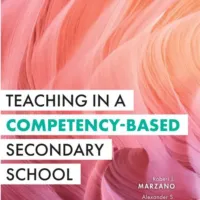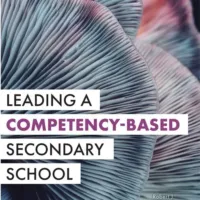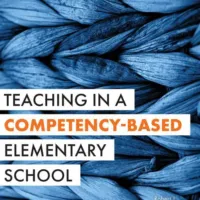
Question:
If I mark a student proficient in September, won’t they forget it by March?
Answer:
The short answer is yes.
People often express concern about marking a learner proficient early in the school year and then progressing to other learning. They worry, rightly so, that learners will not remember what they learned and therefore should not be considered proficient. There is truth to this. Humans will not easily recall information and knowledge if they do not revisit, recall, and use it for some time. While the use of proficiency scales to build assessments and drive instruction will bring deeper focus to the learning, the learner can lose the knowledge used to gain understanding if not applied in critical thinking – like decision making, problem-solving, or hypothesizing. So how do we help learners stay proficient over time? There are 2-ways we think about this at Marzano Academies: Knowing what it means to be competent and using a process of distributed practice we call Cumulative Review.
One should expect a person to forget when thinking about the process of human learning. To help address this, a teacher should clearly define what we mean when we say a learner is proficient or competent. Someone competent will have suitable or sufficient knowledge and skill for some purpose. The purpose that determines competency should be clearly defined using the proficiency scale structure developed by Dr. Marzano. More specifically, an educator describes competency in the Scale Level 3.0 content of the proficiency scale. This description is what Marzano Academies calls a Measurement Topic. A Measurement Topic is created by distilling a discipline’s learning standards, such as science, math, art, etc., down to the granular pieces of information and knowledge. It creates clear statements for what concepts students should demonstrate they understand or strategies they will execute without error. The Scale Level 3.0 Measurement Topic clearly defines what it means to be proficient based upon the current maturity level of the learner who will be interacting with the content and the number of previous exposures they have had to the content.
Marzano Academies recommends that once schools have identified the critical content and turned them into Measurement Topic statements, they place the scales in a progression of learning from the simpler to the more complex. As the learners advance through the scales, they are exposed to content that will require them to assimilate and accommodate the new information to what they already believe to be true. In other words, they adjust their mental representations of how the world works, their schemas, to account for the new information. Sometimes those changes enhance what they already know or change it. The learning progression will allow the learner to interact with information and see the more subtle and abstract relationships within the knowledge to help explain the concept or execute the strategy without error at an even deeper level.
The learning progression will allow the learner to interact with information and see the more subtle and abstract relationships within the knowledge to help explain the concept or execute the strategy without error at an even deeper level. So, the teacher’s goal for the learner just beginning to understand decimals should not be for them to become the master of all things decimals. Instead, they should help the learner get to a level of understanding how to calculate and represent decimals. This level of understanding decimals would be considered competent thinking because of their maturity, they are still developing a sense of the abstract, and also because of the number of previous exposures to the content, which would be zero since they are just beginning. As they matriculate through the learning progression levels based on demonstration of competency, the learner will be exposed to applications of decimals that will require them to add to their fundamental understanding and develop an ability to communicate using decimals in more subtle ways. The same is true for any content area.
In addition to understanding what it means to be competent, teachers can use Dr. Marzano’s process of Cumulative Review. “Cumulative Review is a very robust process that integrates review strategies and revising strategies. In general, cumulative Review means that teachers continually review content identified in the proficiency scales for each measurement topic” (Marzano, 2021). The teacher uses the process to ensure the critical concepts are explicitly brought forward and restated as the learner interacts with more sophisticated applications of the knowledge.
If forgetting is part of learning, reviewing and recalling are essential to remembering. The goal of Cumulative Review is not to review every topic in every review session. Instead, it should be for the identified critical concepts that fit the new content. As a learner begins to interact with knowledge, concepts, and strategies of a new proficiency scale, the teacher deliberately plans for the learner to review the content of previous proficiency scales the learner has already demonstrated at a proficient level. These scales come from the current or earlier levels of the progression, depending on what the teacher finds appropriate for the learner. Cumulative Review involves three cognitive processes: record, review, and revise. A teacher can use a five-step process and specific strategies to encourage learners to engage in the cognitive processes of Cumulative Review. They are:
- Identify the important knowledge and understandings previously covered.
Recognize that not all content previously covered is of equal importance. The teacher must identify and highlight for the learners what is the critical knowledge and why.
- Review the important content
- Make connections between and among previous topics
- Ask students to identify and discuss the misconceptions they have had, and
- Ask students to generate new generalizations.
An educator should measure proficiency because one will not forget something as one ages. At one time, I was proficient enough in circuit design to build electronic instruments used on the Space Shuttle. To return to that level would require me to revisit, recall, and use the knowledge again. Not to mention catching up on all the advancements in the field of electronics since the late 1990s.
Instead, determine if a learner is thinking competently by comparing the evidence they produce when applying the knowledge to demonstrate they understand the concept or can execute the strategy without error against the clear criteria represented in the Scale Level 3 of the proficiency scale. Then as they progress from the simple to more complex in the learning progression, we bring the previously mastered material forward for review so they can assimilate or accommodate their previous understanding of the measurement topic.
For more information on how Marzano Academies can support you, your school’s, or your district’s vision of competency-based education or to discuss any of these points further, don’t hesitate to contact us at: bill.zima@marzanoacademies.org or by visiting our website: marzanoacademies.org. We are here to help.
Resources:
Marzano, R. (2021). Competency-Based Education Folio Series: Element IVa Reviewing Content [Ebook]. Centennial: Marzano Academies.





